
Jordan Hill, MCD, RD, CSSD is a Registered Dietitian and Certified Specialist in Sports Dietetics. She works with athletes of all ages, those struggling with disordered eating, and the general population looking to improve overall health and wellness.

Chances are, you’ve experienced bloating before, and though it’s incredibly common, some people deal with the discomfort more often or more intensely than others. In fact, an estimated 1 in 7 adults experience bloating at least once a week. And while bloating is usually harmless, that doesn’t make it any less uncomfortable.
Thankfully, there are ways to help this unpleasant (and sometimes painful) sensation. From probiotic supplements to greens powders to fiber supplements, the right product can impact digestive ailments and stomach pain and support long-term gut health. But which one is right for you?
That’s where I come in. As a registered dietitian, I’ve combed through the market and hand-picked these top-rated options. Each bloating supplement offers something different, and I’m confident there’s something in this mix for everyone.
Top Supplements for Bloating at a Glance
- Live it Up Super Greens – Best Comprehensive Supplement
- Olly Beat the Bloat – Best Digestive Enzyme Supplement
- Love Wellness Bye Bye Bloat – Best Formula for Women
- HUM Flatter Me+ – Best Clinically-Backed Supplement
- Hilma Gas + Bloat Relief – Best Herbal-Only Option
- Emma Daily Digestive Supplement – Best Splurge
How to Be Less Bloated: A Dietitian’s Perspective
Occasional bloating is incredibly common. While it’s usually not cause for concern, it can be uncomfortable, frustrating, and disruptive. The good news? There are a few science-backed ingredients and habits that can make a real difference in how your digestive system feels and functions. Here's what I look for in a supplement as a registered dietitian.
- Digestive Enzymes like papain (from papaya), bromelain (from pineapple), and vegetarian pepsin support your body’s ability to break down proteins, fats, and carbohydrates more efficiently. This can ease the burden on your digestive system and help with the buildup of gas that causes bloating.
- Probiotics are beneficial bacteria that help maintain digestive balance, support nutrient absorption, and reduce inflammation. Most supplements contain between 1 and 10 billion CFUs (colony-forming units) per dose. Look for products with well-researched strains and clearly labeled CFU counts.
- Prebiotics, like inulin, act as fuel for probiotics, helping them thrive and improve your overall gut health. You might also see other prebiotics listed on labels, such as, Fructooligosaccharides (FOS), Galactooligosaccharides (GOS), or Acacia fiber. However, it’s worth noting that prebiotic fiber can cause bloating or gas in some people, especially when taken in large amounts or introduced too quickly.
- Natural botanicals such as peppermint, ginger, and dandelion have long been used to ease digestive discomfort. Peppermint may help relax intestinal muscles, easing cramping and gas. Ginger supports motility (how food moves through the digestive tract) and can aid nausea. Dandelion acts as a gentle diuretic, helping to stimulate digestion.
- Certain sugars and sugar substitutes (like sorbitol or sucralose) can ferment in the gut and lead to bloating and abdominal discomfort. Choosing supplements without added sugar, artificial sweeteners, or synthetic additives can help minimize unwanted side effects.
- Vitamins and minerals like magnesium and zinc play essential roles in digestive health. Magnesium supports regularity by relaxing the muscles of the GI tract, and zinc helps maintain the gut lining and aids in nutrient absorption. Look for well-rounded formulas with moderate doses (not megadoses) of these nutrients.
The 6 Best Supplements to Help Bloating
There’s no one-size-fits-all solution for bloating, but the right supplement can make a big difference, especially when it’s targeted to your body’s unique needs. Below, I’ll break down six top-rated bloating supplements, highlighting the pros and cons of each, from ingredients and allergens to pricing and third-party testing.This list offers a range of formulas to help support digestion and ease occasional bloating.
1. Live it Up Super Greens: Best Comprehensive Supplement
Live it Up Super Greens is a nutrient-dense greens powder designed to support energy, digestion, gut health, and immune function. This premium supplement blends 20+ ingredients, including a robust digestive enzyme complex, 5 billion CFUs of probiotics (from four strains), organic vegetables, and additional superfoods like ginger, dandelion leaf, peppermint, spirulina, and chlorella. It’s meant to be taken once daily, mixed into water, milk, or a smoothie.
What I Liked
- Includes a wide range of bloat-targeting ingredients, including digestive enzymes, probiotics, and superfoods
- 100% vegan and free from gluten, dairy, soy, nuts, and caffeine
- Free of artificial sweeteners, flavors, fillers, and coloring
- Manufactured in a GMP-certified facility and third-party tested for quality and purity
- Comes in two tasty flavors: Original (subtly sweet and minty) and Wild Berries (tart and fruity)
- 30-day money-back guarantee and free shipping for all customers
What I Didn’t Like
- Only available on the company website
- Not be as convenient as taking a capsule
Price: Live it Up costs $59.99 ($1.99 per serving) for a one-time purchase, but customers have the option to subscribe and save, lowering the cost to $39.99 ($1.33 per serving).
Bottom Line: While Live it Up Super Greens isn’t specifically marketed as a bloating supplement, its thoughtful blend of probiotics, digestive enzymes, and anti-inflammatory superfoods makes it a standout choice for occasional bloating and supporting gut health from a variety of angles. With added health benefits like energy and immune support, it’s a powerhouse supplement for anyone looking to take their daily wellness routine to the next level.
2. Olly Beat the Bloat: Best Digestive Enzyme Supplement
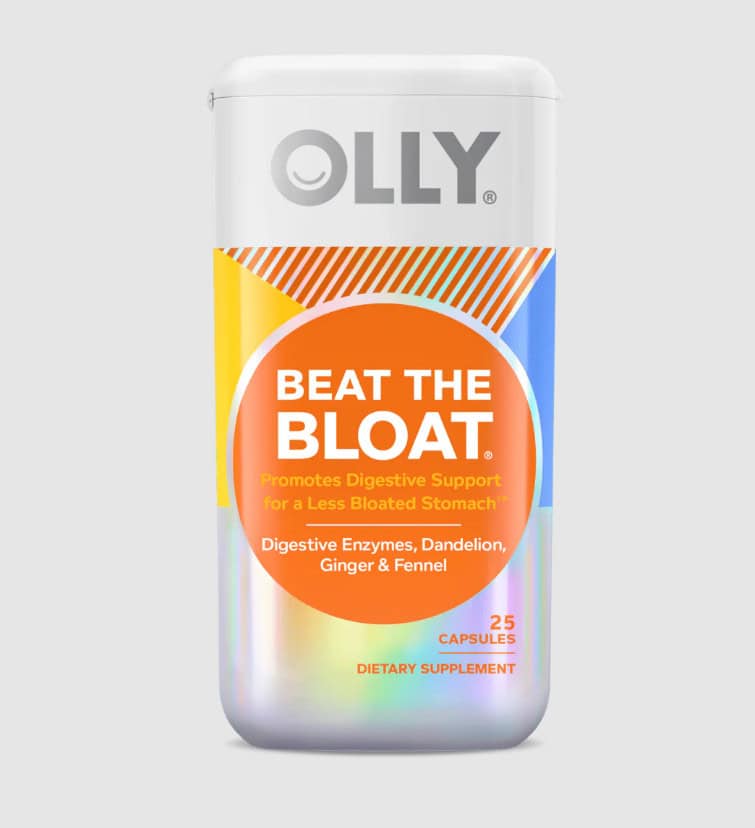
Olly Beat the Bloat is a supplement designed to support your body’s ability to break down fats, carbs, lactose, and vegetable fibers for less occasional bloating and more digestive comfort. The product includes a digestive enzyme blend with five enzymes—amylase, cellulase, hemicellulase, lactase, alpha-galactosidase, and lipase—as well as dandelion extract, fennel extract, and ginger extract.
What I Liked
- NSF-certified and third-party tested
- Includes a variety of ingredients designed to support and promote proper digestion, including digestive enzymes and herbs
- Free of synthetic flavors and colors and vegetarian
What I Didn’t Like
- Does not include probiotics, which may be a drawback for some
- Contains soy, milk, and wheat, making it unsuitable for those with lactose intolerance or wheat or soy allergies
- One of the side effects of the product is that it’s associated with occasional bloating
Price: Olly Beat the Bloat costs $17.99, or $15.29 with a subscription. Each package includes 25 supplements, with a recommended dose of 1 to 3 per day, bringing the cost per day to between $0.61 and $2.16, depending on your usage.
Bottom Line: Olly Beat the Bloat combines digestive enzymes with herbal extracts like dandelion, fennel, and ginger to support gut health and aid occasional bloating. While the formula is vegetarian and third-party tested, it does contain common allergens (soy, milk, and wheat) and may cause bloating or an upset stomach in some individuals. If you're looking for a product that includes probiotics or need something allergen-free, this may not be the best fit.
3. Love Wellness Bye Bye Bloat: Best Formula for Women
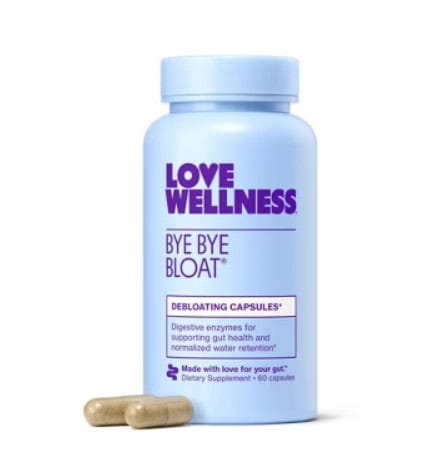
Created by Love Wellness, Bye Bye Bloat is a supplement designed to address common causes of bloating in women, including hormonal fluctuations, PMS, and difficulty digesting gluten and dairy. The formula includes a blend of organic botanicals like dandelion root powder, fennel seed, ginger root, parsley leaf, and fenugreek seed, along with digestive enzymes, such as amylase, protease, pepsin, lipase, bromelain, and papain.
What I Liked
- Made with traceable ingredients and third-party tested for safety and purity
- Sugar-free, gluten-free, dairy-free, and non-GMO
- Free of artificial colors, flavors, dyes, and sweeteners
- Many ingredients are organic
What I Didn’t Like
- Contains maltodextrin, which may cause digestive discomfort in some people
- Lacks probiotics, which some users may prefer in a gut health supplement
- May not fit men’s bloating needs
Price: A one-time purchase of Bye Bye Bloat costs $24.99, but customers have the option to subscribe and save by paying for a 1-month supply (20% off), a 3-month supply (25% off), or a 6-month supply (30% off). Users are advised to take 2 capsules per day, making the cost per day approximately $1.67 with a one-time purchase and $1.33 with a 1-month subscription.
Bottom Line: Bye Bye Bloat stands out for its clean and allergen-friendly formula marketed primarily to women, making it a solid choice for those seeking a straightforward digestive support supplement. That said, the addition of maltodextrin may be a drawback for sensitive users, and the lack of probiotics could be a miss if you're looking for more comprehensive gut support.
4. HUM Flatter Me+: Best Clinically-Backed Supplement
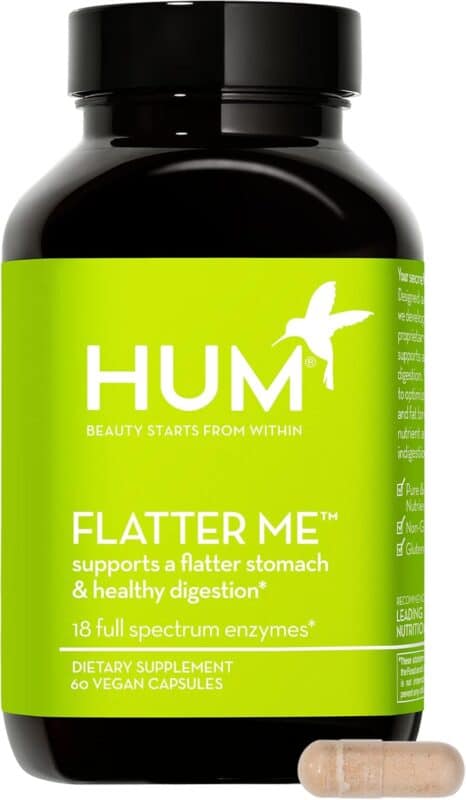
Flatter Me Plus is a supplement designed to “debloat,” support regularity, and assist with healthy digestion. The formula includes a wide range of digestive enzymes, herbal extracts, and inulin, along with two strains of probiotics delivering 1.5 billion CFUs per serving. According to HUM, the product uses clinically tested ingredients that “promote regularity in as little as two weeks, debloat in 30 minutes, and reduce bloat by up to 2 inches.”
What I Liked
- Allergen-friendly; free of eggs, milk, fish, shellfish, tree nuts, peanuts, wheat, soy, sesame, and 100% vegan
- Includes results from a clinical study, and the product is medically reviewed and third-party tested
- Clean Label Project certified and Non-GMO Project Verified
What I Didn’t Like
- The clinical trial messaging may set overly specific expectations. Test results like “debloat in 30 minutes” or “reduce bloat by up to 2 inches” may not apply universally
Price: A one-time purchase costs $33 for a 30-day supply (60 capsules, taken twice daily), which breaks down to about $1.10 per day. A subscription reduces the price to $26.40, or $0.88 per day.
Bottom Line: If you're looking for a bloat support supplement that combines digestive enzymes, prebiotics, probiotics, and herbal extracts, and you appreciate third-party certifications, Flatter Me+ is a thoughtfully formulated option. Just keep in mind that individual results may vary, even if clinical trial results look impressive on paper.
5. Hilma Gas + Bloat Relief: Best Herbal-Only Option
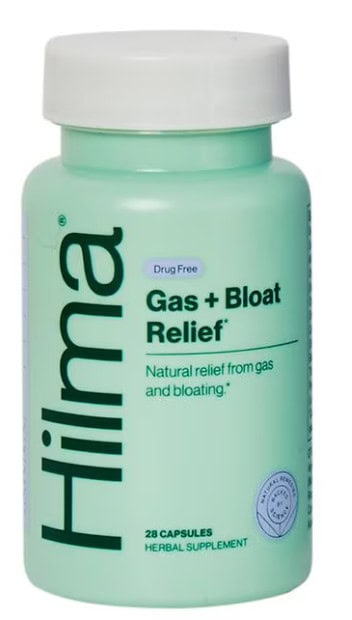
Hilma’s Gas + Bloat Relief is designed as a “go-to” for after a big meal, that time of the month, or while traveling. Geared toward women, the product stands out from other herbal supplements by including five meticulously selected core ingredients: fennel powder, anise powder, caraway powder, lemon balm extract, and peppermint extract. This bare-bones formula focuses on herbs that people have used for digestion for centuries with zero additives.
What I Liked
- Allergen-friendly and certified vegan
- Third-party tested, non-GMO, and packaged in a shared cGMP (current Good Manufacturing Practices) facility
- Free from dyes, fillers, artificial preservatives, and artificial sweeteners
What I Didn’t Like
- Does not include digestive enzymes or probiotics, which may be a drawback for some
- Although allergen-friendly, it’s packaged in a facility that processes milk, egg, soy, and tree nuts—individuals with those allergies should exercise caution
- The formula is tailored toward women, which may make it feel less inclusive for all audiences
Price: This product costs $36 for 100 capsules, with a subscription option bringing the cost down to $32.40. The recommended use is two capsules as needed, up to six daily, putting the cost per use between $0.65 and $1.95 per day, depending on dosage.
Bottom Line: Hilma Gas + Bloat Relief is a clean, herb-based option for managing occasional bloating and gas, especially for women. While it lacks probiotics and digestive enzymes, its minimalist, natural formula makes it a strong choice for those seeking plant-based support without extra additives.
6. Emma Daily Digestive Supplement: Best Splurge
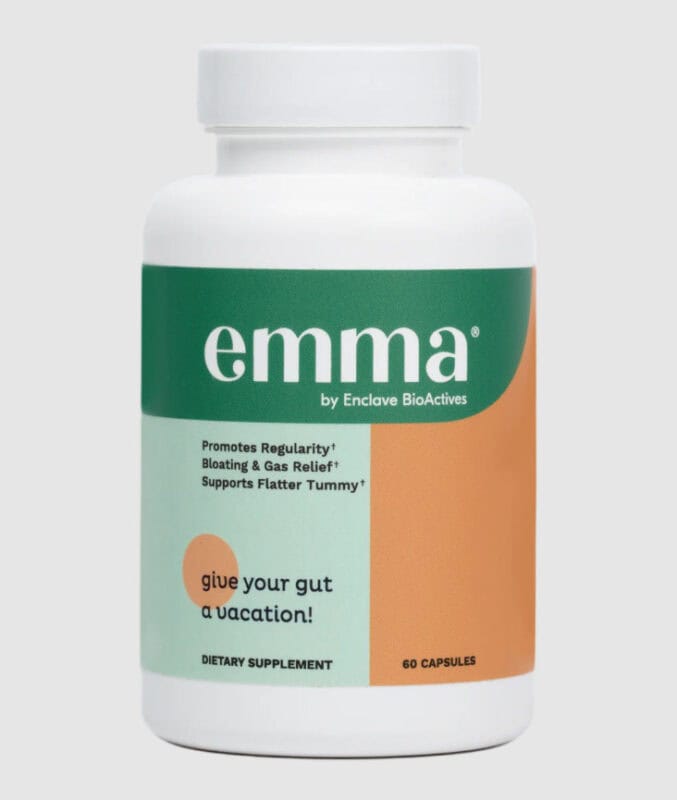
Designed to support regularity, bloating and gas relief, and weight management, Emma’s Daily Digestive Supplement features a blend of vitamins, minerals, prebiotics, and herbal ingredients. Key components include chicory root inulin, DGL licorice, star anise, quercetin, resveratrol, and berberine.
What I Liked
- Claims to be doctor-endorsed
- Includes meticulously chosen ingredients that support digestion and gut health
- Made in a GMP-compliant facility in the United States
- Many positive customer reviews
What I Didn’t Like
- Relatively expensive compared to similar products
- Does not include digestive enzymes or probiotics, which may not be suitable for some
- Several vitamins and minerals exceed 100% of the Daily Value, which may be unnecessary for most people
- No information available on third-party testing
- No subscription discount is offered
Price: Emma Daily Digestive costs $59.00, and users are advised to take two capsules per day. This means the cost breaks down to $1.97 per day.
Bottom Line: Emma Daily Digestive Supplement offers a science-backed ingredient list with a focus on gut health, but at a premium price for not as much value. The lack of digestive enzymes, probiotics, and third-party testing may be dealbreakers for some. Still, it could appeal to those looking for a supplement that blends prebiotics and antioxidant-rich botanicals.
How I Evaluated Each Supplement
With so many options to choose from, I needed to set a high bar to determine the best dietary supplements for bloating on the market. I evaluated each product using a consistent set of criteria to identify formulas that are not only effective at supporting stomach discomfort but are also safe, transparent, and reasonably priced. Here's what I looked for:
Quality
Not all supplements are evaluated by the FDA, meaning a lot of the time, you need to rely on testing and quality measures set up by the company itself. I prioritized supplements made in GMP-certified (Good Manufacturing Practices) facilities and looked for products that were third-party tested to ensure safety, purity, and label accuracy. I also favored brands that avoid common allergens, unnecessary fillers, and artificial additives like dyes and preservatives. Certifications like NSF, Non-GMO Project Verified, or Clean Label Project Certified were also considered as quality indicators.
Formula
To narrow down the list, I focused on formulas that included research-backed ingredients known to help with digestion and bloating relief. These included probiotics, digestive enzymes (like amylase, protease, and lipase), anti-inflammatory herbs (such as ginger and dandelion), and prebiotic fibers (like inulin). I avoided products that have too many added sugars, artificial sweeteners, or synthetic additives, as these can sometimes contribute to digestive discomfort rather than relieve it.
Price
Digestive support shouldn’t break the bank, and I wanted to select products that would be financially accessible for most individuals. I calculated the cost per serving for each product and weighed that against ingredient quality and the strength of the formula. Subscription discounts, shipping costs, and money-back guarantees were noted, but I also considered how reasonable the one-time purchase price was compared to competitors.
Reviews
To gauge whether a product lived up to its claims, I read through verified customer reviews across multiple platforms. I looked for recurring patterns in user feedback, especially around digestive comfort, bloating support, and overall gut health. I gave extra weight to reviews that mentioned consistent results over time and flagged any reports of side effects or misleading marketing claims.
Do Anti-Bloat Supplements Work? Final Thoughts
Anti-bloat supplements can be helpful, but they’re not a cure for digestive issues, especially if you’re dealing with a more serious GI condition. Everyone’s gut is different, and what eases bloating for one person may actually make things worse for another. That’s why it’s important to consider the full picture: your symptoms, your diet and lifestyle, and the specific ingredients in each product.
Some supplements, like Hilma Gas + Bloat Relief and Love Wellness Bye Bye Bloat, focus on herbs to help soothe the digestive system. Others, like HUM Flatter Me+, take a more comprehensive approach by combining enzymes, probiotics, and prebiotics. The most effective choice will ultimately depend on your individual needs.
That said, Live it Up Super Greens stands out for its thoughtful, well-rounded formula. With probiotics, digestive enzymes, botanicals, and nutrients, it supports digestion from multiple angles while also offering potential benefits like energy and immune support. If you’re looking for a high-quality, allergen-friendly supplement that’s third-party tested for safety, this one is a great place to start.
As with any supplement, consistency is key, and so is listening to your body. When in doubt, it’s always a good idea to check in with a healthcare provider about your symptom severity and for other suggestions to help relieve bloating discomfort.
Frequently Asked Questions about Supplements for Bloating
Still have questions? Here are the answers to our most frequently asked questions about supplements for bloating.
Does anything actually help with bloating?
Yes, bloating supplements containing digestive enzymes, probiotics, and certain herbs like fennel and ginger may help relieve digestive distress. Peppermint oil is known for how it suppresses muscle spasms in the intestines. However, effectiveness varies per person.
Lifestyle changes like healthy eating, exercise, and hydration can also help. But it's important to keep in mind that if you’re experiencing severe discomfort or abdominal pain, you should consult a healthcare professional rather than rely on dietary supplements to treat nausea or other forms of digestive discomfort.
Do carbs make you feel bloated?
Some carbs, especially those high in fiber or certain sugars (like FODMAPs), can ferment in the gut and cause gas, leading to bloating. It can depend on your individual digestion and the types of carbs you eat.
Does soda cause bloating?
Yes, soda’s carbonation introduces gas into your digestive system, which can cause bloating and discomfort. Plus, the sugar or artificial sweeteners may also contribute to digestive upset.
Why am I bloated after working out?
Exercise can shift blood flow away from the digestive tract temporarily, slowing digestion. Also, swallowing air during workouts or dehydration can cause bloating. Hydrating and gentle movement post-exercise can help.
Can stress cause gas?
Yes. Research suggests that stress affects gut motility and increases sensitivity to gas and bloating. It can also disrupt the balance of gut bacteria, making digestive discomfort worse. Managing stress is extremely important for gut health.
What is the number one food that causes bloating?
Beans are one of the most common food triggers for bloating. They contain fiber and complex sugars (like oligosaccharides) that ferment in the gut, bloating, gas, and other digestive problems. Other frequent offenders include dairy, cruciferous vegetables, and artificial sweeteners.
What drink is good for bloating?
Herbal teas like peppermint, ginger, and fennel have anti-inflammatory properties and can help soothe the digestive system. Staying well-hydrated with plain water is also essential. Drinking water helps move things along in your digestive tract and can reduce water retention that sometimes contributes to bloating.
What are some of the main causes of bloating?
Bloating can be caused by overeating, eating too quickly, food intolerances, excess gas, hormonal changes, or health conditions like IBS. Stress, dehydration, and certain ingredients (like sugar alcohols or fiber) can also play a role. Additionally, women are more than twice as likely as men to report bloating, especially during hormonal shifts like menstruation or menopause.
Sources
- https://www.cghjournal.org/article/S1542-3565(22)01020-5/fulltext
- https://www.hopkinsmedicine.org/health/wellness-and-prevention/digestive-enzymes-and-digestive-enzyme-supplements
- https://ods.od.nih.gov/factsheets/Probiotics-HealthProfessional/
- https://www.verywellhealth.com/prebiotics-and-ibs-1944748
- https://pmc.ncbi.nlm.nih.gov/articles/PMC5814329/
- https://www.hopkinsmedicine.org/health/wellness-and-prevention/ginger-benefits
- https://www.healthline.com/nutrition/dandelion-benefits
- https://health.ucdavis.edu/news/headlines/do-sugar-free-candy-and-gum-give-you-gas-researchers-think-they-know-why/2024/02
- https://www.news-medical.net/health/Sucralose-Safety-and-Evidence.aspx
- https://www.goodrx.com/conditions/constipation/magnesium-for-constipation
- https://draxe.com/health/study-women-more-likely-to-feel-bloated-than-men/
- https://www.olly.com/products/olly-beat-the-bloat
- https://lovewellness.com/products/bye-bye-bloat
- https://www.humnutrition.com/product/23/flatter-me
- https://www.hilma.co/products/gas-relief
- https://emmarelief.com/pages/product
- https://www.webmd.com/food-recipes/health-benefits-fennel
- https://www.healthline.com/nutrition/fodmaps-101
- https://www.healthline.com/nutrition/13-foods-that-cause-bloating
- https://www.healthline.com/health/fitness/bloated-after-workout
- https://my.clevelandclinic.org/health/symptoms/23299-colon-spasms
- https://www.jeffersonhealth.org/your-health/living-well/how-stress-affects-your-gut-health
- https://www.nm.org/healthbeat/healthy-tips/nutrition/how-to-beat-the-bloat
The V Nutrition Editorial Team, consisting of experts in vegan nutrition and health, focuses on providing accurate and helpful information. With backgrounds in nutrition science and a shared commitment to plant-based living, we ensure that every piece of content not only educates but also empowers our readers to make informed lifestyle choices.
The V Nutrition Editorial Team, consisting of experts in vegan nutrition and health, focuses on providing accurate and helpful information. With backgrounds in nutrition science and a shared commitment to plant-based living, we ensure that every piece of content not only educates but also empowers our readers to make informed lifestyle choices.
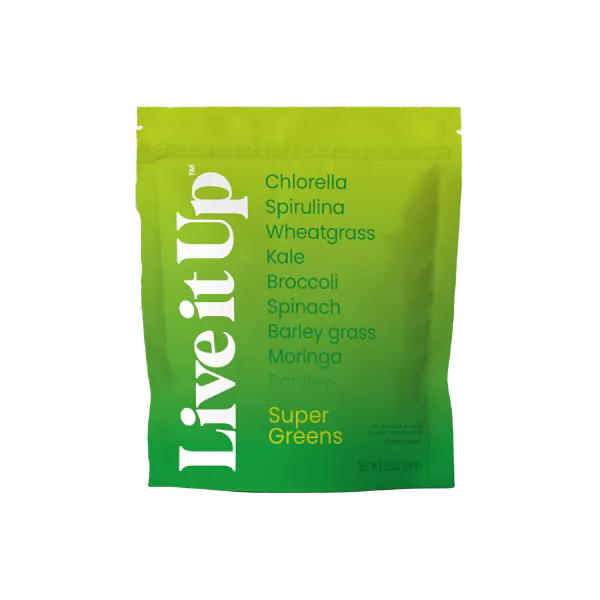

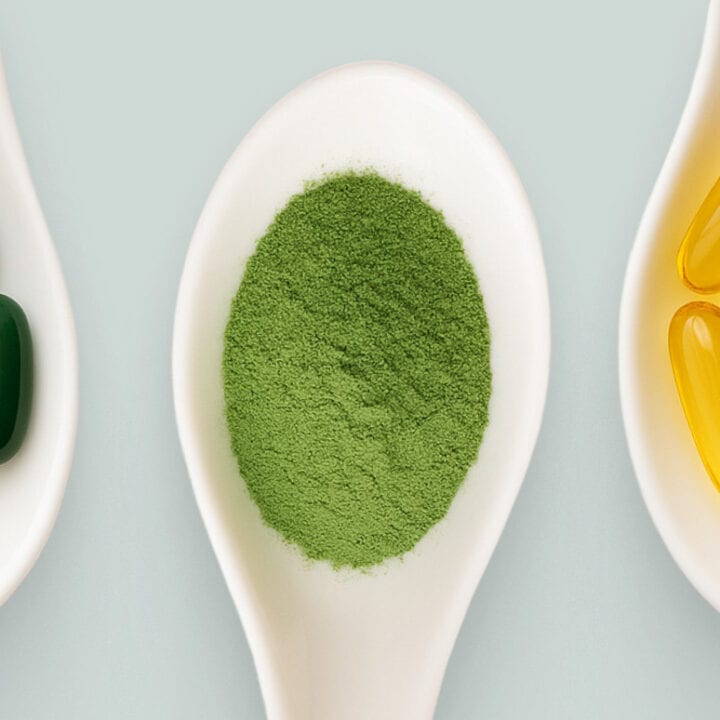
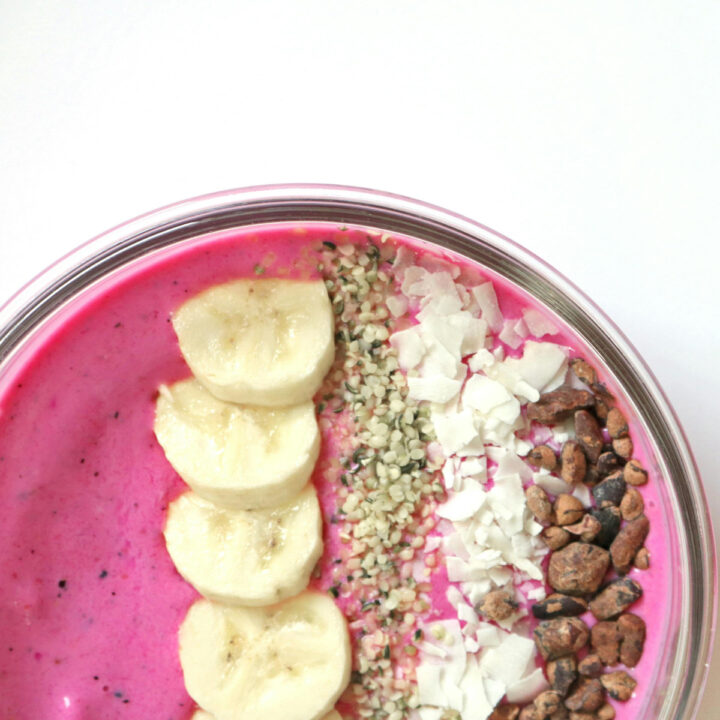

Comments
No Comments